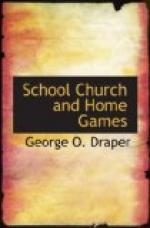FOREWORD
We should all be prospectors of happiness. There are those who discover it in the solitudes of the mountains where freedom is breathed in the air that touches the lofty peaks. Others find it in the depths of the forest in the songs of the birds, of the brook, of the trees. Most of us must find it in the daily walks of life where the seeking is oft-times difficult. Nevertheless, there it is in the manufactured glory of the city, in the voices of children, and in the hearts and faces of men.
Happiness becomes a habit with some; with others it is a lost art. Some radiate it; others dispel that which may exist. Happiness can be produced by means of exercising certain emotions, by causing experiences which allow instinctive expression; the song, the dance, the game are examples.
All enjoyed activity
may be classified as play.
Play is that which we
do when free to do as we like.
Play produces happiness.
Work is the highest form of play. The great artist is playing when his imagination finds expression on the canvas in color. If he did not love to paint he would never have become a great artist. The engineer is playing when he produces the great bridge; the financier when he masterfully organizes his capital.
The imagination of the child leads him into all kinds of adventure. He becomes the engineer on the locomotive; he becomes the leader of the circus band; he is a great hunter of terrible beasts; an Indian, a cowboy, and a robber. In fact, he tries his hand at all those careers which interest him, and we call it play, or may even call it nonsense. In fact, some think play is but nonsense.
Play is the expression, the exercising of the imagination. Should the child be denied the privilege of play, should its visions never find expression, should its mental adventures fail to find adequate physical experience, a great musician, a great engineer, a great statesman, or a master of some great art may be sacrificed.
Play is not only essential to the child, but, as Joseph Lee says, play is the child. The natural environment of the child is a play environment; if we are to lead the child or educate the child we have first to enter into his environment and into fellowship with him therein, and adapt our methods to that environment. The processes of education which have taken to themselves those things which are natural to children will meet deserved success. The schoolroom, the Sunday school room, or home in which a play atmosphere is experienced, small though this experience may be, is operating on a sound basis. Play is nature’s method of education. As a kitten in chasing the leaves in the road is playing, it is also learning to catch the bird or the mouse essential for the maintenance of life. So the child, by nature, learns to live by play.
Activity is life. Directed activity means directed life. The body is but the means of activity and is developed only in accord with the activity demands of the individual. Character is but the trend of the activities of an individual. So the activities are more the individual than is the flesh and bone which we see.




